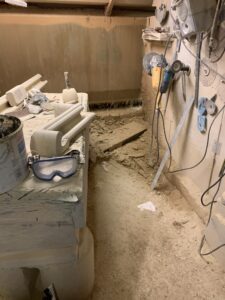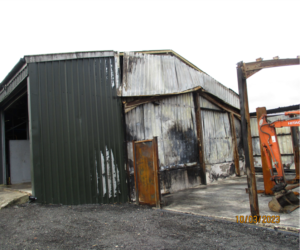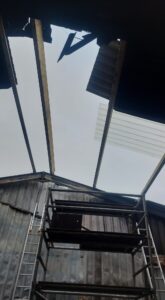Company fined after dad’s legs crushed by 800kg pallet
A manufacturer in Sheffield has been fined after a steel pallet landed on an employee, leaving him permanently disabled.
The 800kg load crushed Wayne Hatton’s legs during a night shift at Amber Precast Ltd’s factory on 14 January 2021.
Mr Hatton, from Doncaster, had his right lower leg amputated with two toes on his left foot also being removed following the incident at Davy Business Park.

The pallet was being removed from a reinforced concrete cast when it fell onto the father-of-two, who had only recently been employed by the firm as a supervisor.
The then 46-year-old spent seven weeks in hospital and now has a prosthetic leg after his right lower leg was amputated.
A Health and Safety Executive (HSE) investigation found the pallet had not been secured onto the lifting chains of the overhead crane before being removed from the concrete cast. This meant the pallet was not supported whilst being moved.

The investigation also found Amber Precast Ltd failed to consistently implement a system of work to ensure the pallet could be removed safely. Mr Hatton, now 50, and other members on his team had not received any information or instructions on how to remove the pallet safely.
HSE guidance can be found at: Provide information, training and supervision: Overview – HSE
Amber Precast Ltd, of Davy Business Park, Prince Of Wales Road, Sheffield, pleaded guilty to breaching Section 2(1) of the Health and Safety at Work etc. Act 1974. The company was fined £60,000 and ordered to pay £5,406.31 in costs at Sheffield Magistrates’ Court on 9 January 2025.
HSE inspector Jane Fox said: “This incident could so easily have been avoided with the correct instruction and implementation of an agreed safe working procedure. Amber Precast Ltd left its employees to work out their own methods of completing the pallet removal task, instead of providing them with suitable training and equipment so it could be done safely every time.”
This prosecution was brought by HSE enforcement lawyer Andy Siddall and supported by HSE paralegal officer Rebecca Withell.

Notes to editors:
- The Health and Safety Executive (HSE) is Britain’s national regulator for workplace health and safety. We are dedicated to protecting people and places, and helping everyone lead safer and healthier lives.
- More information about the legislation referred to in this case is available.
- Further details on the latest HSE news releases is available.
- HSE does not pass sentences, set guidelines or collect any fines imposed. Relevant sentencing guidelines must be followed unless the court is satisfied that it would be contrary to the interests of justice to do so. The sentencing guidelines for health and safety offences in England and Wales can be found here and for those in Scotland here.




